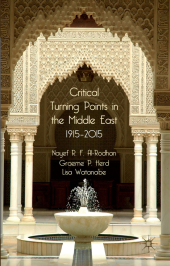 Neuerscheinungen 2011Stand: 2020-01-07 |
Schnellsuche
ISBN/Stichwort/Autor
|
Herderstraße 10
10625 Berlin
Tel.: 030 315 714 16
Fax 030 315 714 14
info@buchspektrum.de |

Nayef R.F. Al-Rodhan, Graeme P. Herd, Lisa Watanabe
(Beteiligte)
Critical Turning Points in the Middle East
1915 - 2015
Nayef R.F. Al-Rodhan, Graeme P. Herd and Lisa Watanabe
2011. 2011. xv, 256 S. 5 maps, 2 b/w tables, 3 figures. 216 mm
Verlag/Jahr: SPRINGER PALGRAVE MACMILLAN 2011
ISBN: 1-13-731191-6 (1137311916)
Neue ISBN: 978-1-13-731191-7 (9781137311917)
Preis und Lieferzeit: Bitte klicken
This book, now in paperback, takes a novel look at the modern Middle East through the prisms of six cascading negative critical turning points. It identifies the seeds of a potential seventh in the collective dignity deficits generated by poor governance paradigms and exacerbated by geopolitical competition for the region´s natural resources.
This book takes a novel look at the modern Middle East through the prisms of six cascading negative critical turning points. It identifies the seeds of a potential seventh in the collective dignity deficits generated by poor governance paradigms and exacerbated by geopolitical competition for the region´s natural resources.
Introduction The Historical Legacy - The Rise and Fall of the Golden Era The First Critical Turning Point - 1915-22 The Second Critical Turning Point - 1948 The Third Critical Turning Point - 1967 The Fourth Critical Turning Point - 1979 The Fifth Critical Turning Point - 1987-91 The Sixth Critical Turning Point - 2001 Implications for a Potential Critical Seventh Turning Point - 2011-15 Afterword
"This is a thoughtful and thought-provoking study that makes evident the history behind the current situation. The study concludes with a set of recommendations designed to promote stability and security." - Book News Inc: Reference and Research Book News "This book offers a unique way of looking at the events that have transpired in the Middle East over the past century. Interpreting events through the prism of good governance and dignity deficits offers the reader a chance to see how the same moment in time can be viewed by different audiences with sometimes tragic consequences. The authors´ ability to use these past events as a way to shape future policies in and toward the region are most insightful." - Roger Kangas, Washington D.C., USA. "[This book] provide a remarkably balanced and insightful picture of the forces that have driven the Arab world over the past Century. Unlike so many other studies, it explains events from an Arab perspective [...] and the critical impact of the Arab-Israeli conflict without choosing sides. The final section on "dignity deficits" makes it clear that the fact the underlying forces involved are not driven by problem in Islam or by some "clash between civilizations," and provides realistic and balanced priorities for dealing with problems that the Arab world must now solve to move forward." - Anthony H. Cordesman, Washington D.C., USA "At long last a book on the Middle East which is free from the usual Western stereotypes of Arabs and Muslims [...] The result is a thoughtful and thought-provoking book on an eventual century in Middle Eastern history." Avi Shlaim, University of Oxford, UK


